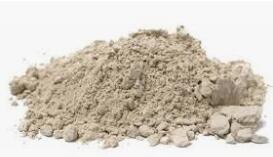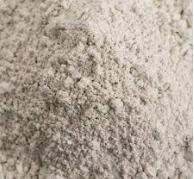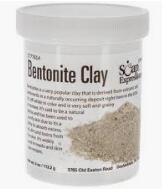Bentonite - an overview
History
Bentonite is an absorbent aluminium phyllosilicate clay consisting mostly of montmorillonite. The term Bentonite was first used for a clay found in about 1890 in upper cretaceous tuff near Fort Benton, Wyoming. The main constituent, which is the determinant factor in the clay's properties, is the clay mineral montmorillonite. This in turn, derives its name from a deposit at Montmorillon, in Southern France.1
Natural occurrence
Bentonite occurs in rocks that were deposited in the Ordovician to Neogene periods (about 488.3 to 2.6 million years ago). In the United States the principal producers are Wyoming, Montana, California, Arizona, and Colorado. In 2011, the U.S. had almost an one-third share of the world's production, followed by China and Greece.2 Other important world producers are Japan, Italy, Brazil, Romania, Germany, Mexico, Argentina, Spain, India, Hungary, Poland, Canada, Turkey, and Cyprus.3
Formation
The formation of bentonite involves the alteration of volcanic glass to clay minerals; this requires hydration (taking up or combination with water) and a loss of alkalies, bases, and possibly silica, with the preservation of the textures of the original volcanic glass. Bentonite consists chiefly of crystalline clay minerals belonging to the smectite group, which are hydrous aluminum silicates containing iron and magnesium as well as either sodium or calcium. Two types of bentonite are recognized, and the uses of each depend on specific physical properties.3 Sodium bentonites absorb large quantities of water, swelling to many times their original volume, and give rise to permanent suspensions of gellike masses. These have been used to seal dams; in bonding foundry sands, asbestos, and mineral wool; as drilling muds; in portland cements and concrete, ceramics, emulsions, insecticides, soaps, pharmaceuticals, and paints; in the manufacture of paper; for clarifying water, juices, and liquors; and as a water softener to remove calcium from hard water. Calcium bentonites are nonswelling and break down to a finely granular aggregate that is widely used as an absorbent clay sometimes called fuller’s earth;3 potassium bentonite is a potassium-rich illitic clay formed from alteration of volcanic ash.4
Applications
Foundry bonds:
Bentonite is used as a bonding material in the preparation of molding sand for the production of iron, steel and non-ferrous casting. The unique properties of bentonite yield green sand moulds with good flowability, compactability and thermal stability for the production of high quality castings. Bentonite is used to provide the bonding strength and plasticity to the sand–clay mixture.
Drilling fluids:
Sodium montmorillonite (Na bentonite) is the major constituent of freshwater drilling muds. The function of the drilling mud is to remove cuttings from the drill hole to keep formation fluids from penetrating into the drilling mud, to lubricate and cool the bit, and to build an impervious filter cake on the wall of the drill hole to prevent the penetration of water from the drilling fluid into the formations and formation fluids from the drilling mud. High viscosity is required in order to remove the cuttings from the hole.5
Pelletizing:
Bentonite is used as a binding agent in the production of iron ore pellets.6 Through this process, iron ore fines are converted into spherical pellets, suitable as feed material in blast furnaces for pig iron production, or in the production of direct reduction iron (DRI).
Cat Litter:
Both calcium and sodium bentonites are used as constituents in cat litter, but for very different reasons. Calcium bentonite is used because of its high absorbent quality. The calcium bentonite is dried, crushed, and sized into a granular product for use as a litter box filler. In recent years, a new litter called clumping cat litter has become the preferred type of litter. This litter is made by blending high swelling sodium bentonite with the calcium bentonite granules. When the feline waste hits this blend of granules, the sodium bentonite swells and forms a hard clump which is easy to remove from the litter box. This saves dumping the litter and also keeps down the odor. Currently, this is the highest annual tonnage use of sodium bentonite.5
Absorbent:
Calcium bentonites are very good absorbent clays. This is because of their surface charge and surface area. Many of the calcium bentonites 116 Applied Clay Mineralogy will absorb up to 100% of their dry weight of water and up to about 80% of their weight of oil.5
Construction and Civil Engineering:
Bentonite in civil engineering applications is used traditionally as a thixotropic, support and lubricant agent in diaphragm walls and foundations, in tunnelling, in horizontal directional drilling and pipe jacking. Bentonite, due to its viscosity and plasticity, also is used in Portland cement and mortars.7
Purification:
Bentonite's adsorption/absorption properties are very useful for wastewater purification because it is easily dispersed and has good adsorptive properties. Dye manufacturers use the sodium bentonite to preferentially adsorb the dye which will sink to the bottom. Bentonite is also used to adsorb paper mill wastes, sewage, and certain industrial wastes. Heavy metals are removed from wastewaters by Ca andNa bentonites.8 Cr, Cu, Ni, Zn, and Cd were adsorbed by the bentonites. Shanableh et al. has achieved the removal of phosphate from water using six Al-, Fe-, and Al-Fe-modified bentonite adsorbents.9
Paper:
Sodium bentonite is used in the de-inking process to recover cellulose fibers. The de-inking process involves heating the recycled paper in a caustic soda solution in order to free the ink pigment. A detergent is then added to release the ink pigment from the cellulose fibers. Sodium bentonite is added to adsorb the ink pigment after which the cellulose fibers are washed to remove the bentonites which carries the ink pigment with it. Sodium bentonite is also used to prevent agglomeration of pitches, tars, waxes, and resinous material.10
Paints:
Montmorillonite clays are used extensively in paints. White bentonites are a preferred material if available. Those which are best are those which carry sodium as the exchangeable cation and are highly colloidal and completely dispersible. In water-based paints, the sodium and/or lithium montmorillonites are suspending and thickening agents. These montmorillonites are also used as an emulsifying agent in both water- and oilbased paint formulations. Organoclays can be tailor made with organic compounds to meet the requirements of different vehicles including lacquers, epoxy resins, and vinyl resins, which are used in paint formulations.5
Catalyst:
Chemically-modified clay catalysts find application in a diverse range of duties where acid catalysis is a key mechanism. Most particularly, they are employed in the alkylation processes to produce fuel additives, in Southern France.11
Food Additives:
Bentonite is utilized in the removal of impurities in oils where its adsorptive properties are crucial in the processing of edible oils and fats (Soya/palm/canola oil). In drinks such as beer, wine and mineral water, and in products like sugar or honey, bentonite is used as a clarification agent. Also, sodium and calcium montmorillonites, when added to corn and other grains, selectively absorbs and removes alpha-toxins.12
Agriculture:
Bentonite is used as an animal feed supplement, as a pelletizing aid in the production of animal feed pellets, as well as a flowability aid for unconsolidated feed ingredients such as soy meal. It also is used as an ion exchanger for improvement and conditioning of the soil. When thermally treated, it can be used as a porous ceramic carrier for various herbicides and pesticides.13
Pharmaceuticals:
Bentonite is used as filler in pharmaceuticals, and due to its absorption/adsorption functions, it allows paste formation. Such applications include industrial protective creams, calamine lotion, wet compresses, and antiirritants for eczema. In medicine, bentonite is used as an antidote in heavy metal poisoning. Personal care products such as mud packs, sunburn paint, baby and facepowders, and face creams may all contain bentonite. Bentonite clay has also been shown to act as a detoxifying agent. This property is referred to its poly-cationic nature, which leads to absorption of negative charge toxins.14

Detergents:
Sodium bentonite is used as a detergent in dry-cleaning heavily soiled fabrics. The bentonite absorbs the dirt and other staining material and is removed from the fabric with the dry-cleaning fluid. White bentonite is used in detergents after conversion to molecular sieves. This has become a much more prevalent use because the use of phosphate in detergents has been severely restricted in the past several years because of environmental concerns.5
Organoclays:
Sodium montmorillonites with a high exchange capacity and hectorite are specially processed to make organoclays. In this process, the exchangeable ions are replaced with organic compounds such as alkylamines and many others. These organoclad montmorillonites are used as thickeners in paints, greases, oil-base drilling fluids, to gel various organic liquids, cleanup oil spills, and recently nanocomposites.
References
1. Hosterman, J.W. and S.H. Patterson. 1992. Bentonite and Fuller's earth resources of the United States. U.S. Geological Survey Professional Paper 1522. United States Government Printing Office, Washington D.C., USA.
2. T. Brown et al. 2013. World Mineral Production 2007–11. British Geological Survey, Nottingham, England.
3. Encyclopædia Britannica https://www.britannica.com/science/bentonite
4. Potassium bentonite. McGraw-Hill Dictionary of Scientific and Technical Terms.
5. Haydn H. Murray, Developments in Clay Science, Volume 2, 2006, Pages 111-130.
6. Devaney, F.D. (1956) Process of Preparing Indurated Pallets of Iron Ore Fines. US Patent 2,713,172.
7. http://www.pmstp.com/civil/bentonite/bentonite.html
You may like
Related articles And Qustion
See also
Lastest Price from Bentonite manufacturers

US $0.00/KG2025-08-20
- CAS:
- 1302-78-9
- Min. Order:
- 25KG
- Purity:
- 99%
- Supply Ability:
- 200MT

US $0.00/KG2025-08-14
- CAS:
- 1302-78-9
- Min. Order:
- 25KG
- Purity:
- 99%
- Supply Ability:
- 200MT




